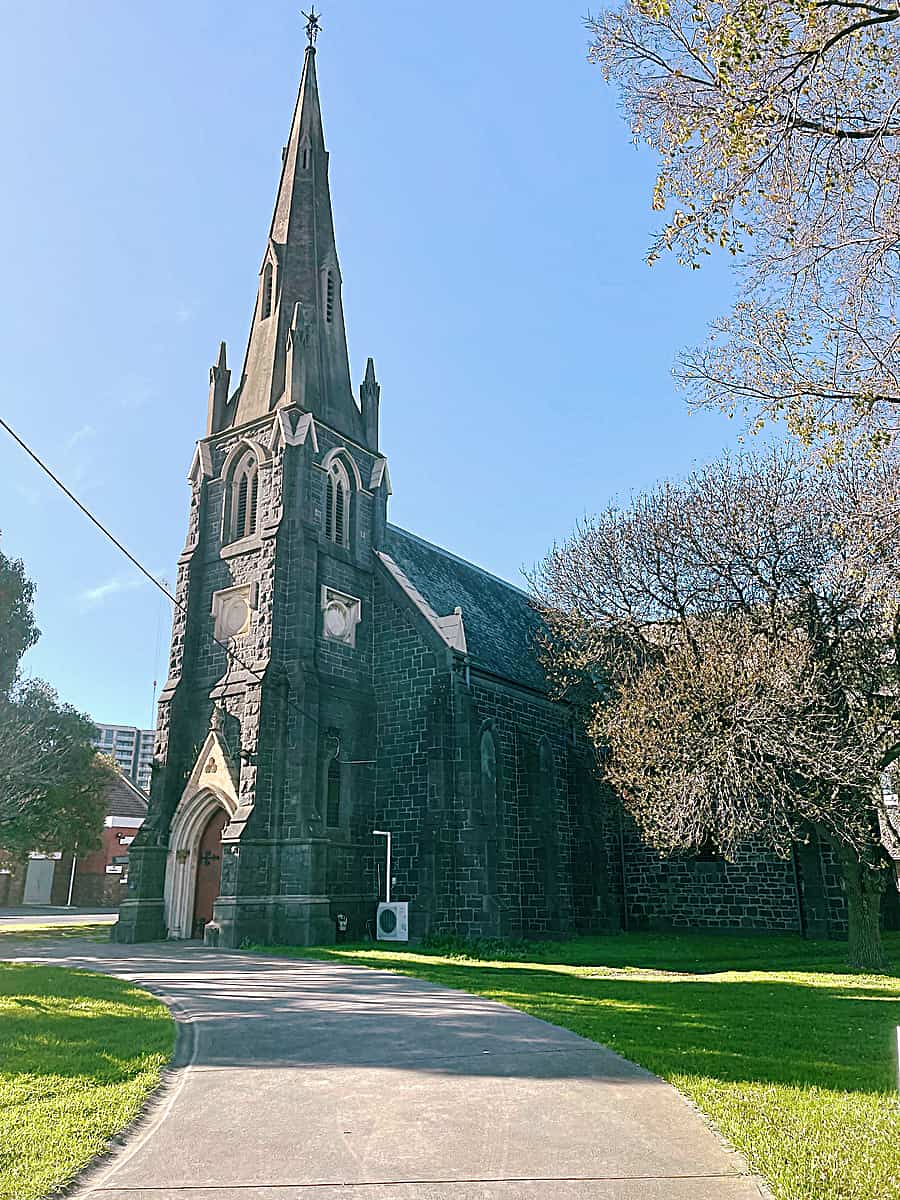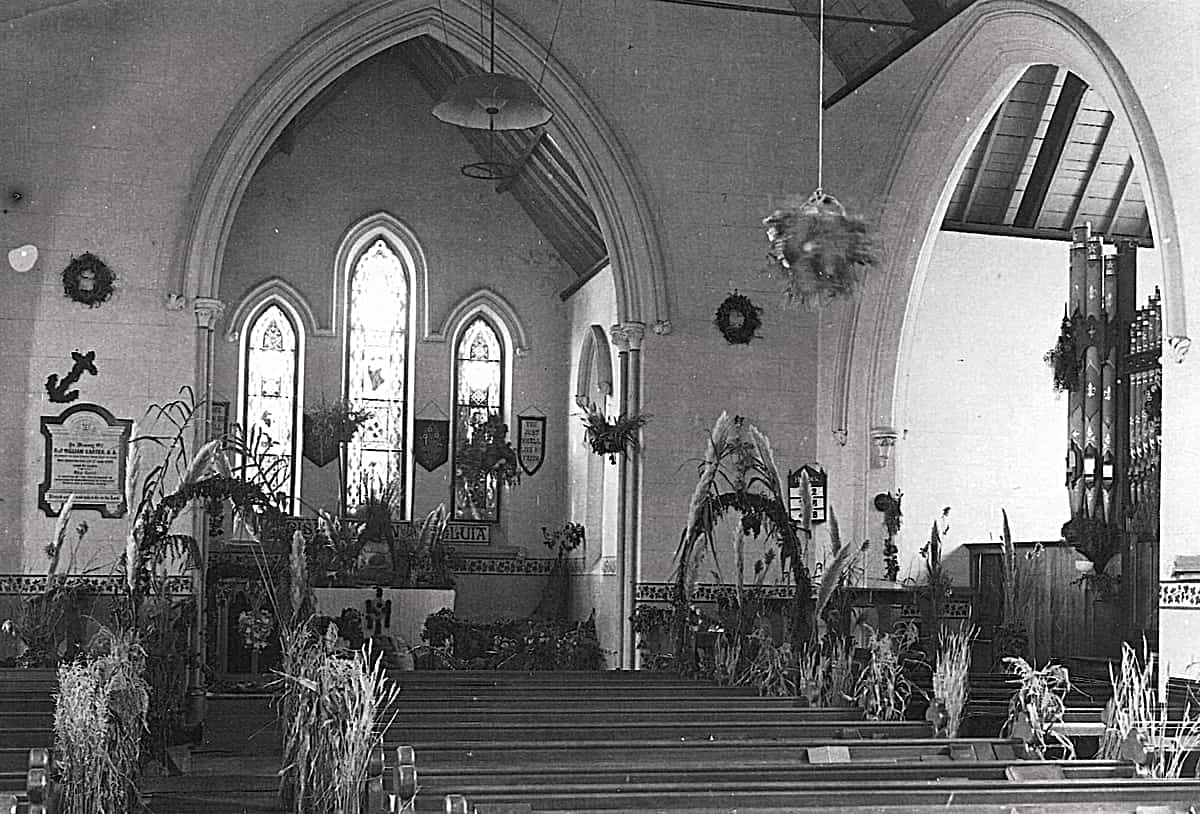
Holy Trinity Anglican Church, Coburg – exterior from the south-west
[photograph by John Maidment (June 2023)]
Historical and Technical Documentation by John Maidment
© OHTA (last updated August 2023)

Holy Trinity Anglican Church, Coburg – exterior from the south-west
[photograph by John Maidment (June 2023)]
Historical and Technical Documentation by John Maidment
© OHTA (last updated August 2023)
The foundation stone of the present church building was laid on 9 October 18541 and the building opened on 30 September 1855. The architect was Charles Vickers and the building constructed in bluestone in a Gothic idiom. The spire was added in 1869.

Holy Trinity Anglican Church, Coburg – organ placed in south transept after 1892
[photograph from the Coburg Historical Society collection)
The specification for a new two-manual organ was listed in the Fincham correspondence book for 16 October 1888. The specification was drawn up by Dr G.W. Torrance, Vicar of Holy Trinity Church, Balaclava.
| GREAT Open Diapason Claribel Dulciana Principal Flute Fifteenth Swell to Great |
8 8 8 4 4 2 |
||
| SWELL Double Diapason Open Diapason Gedact Gamba Gemshorn Mixture Oboe |
16 8 8 8 4 II rks 8 |
TC gvd.bass |
|
| PEDAL Bourdon Great to Pedal Swell to Pedal |
16 |
3 composition pedals to Great2
Built with remarkable speed, probably using premade components, the organ was opened in the church on 27 December 18883. It was initially placed at the west end on the floor but moved to the south transept in October 1892. In 1893, Fincham added a Clarionet to the Great and a Celeste to the Swell4. It included a standard two-tower case.

Holy Trinity Anglican Church, Coburg – organ after relocation and rebuilding 1957
(photograph from Dedication of the Rebuilt Organ, 15 September 1957)
In 1956, it was proposed to rebuild the organ. Hill, Norman & Beard were commissioned to carry out the work, the consultants being Ernest Philip Skillicorn (organist) and James Thacker. The work included new electro-pneumatic action, a detached stopkey console and many tonal revisions. The organ was moved to a platform at the west end of the building, the work supervised by Wystan Widdows, architect. The dedication of the organ took place on 15 September 19575.
The Great Lieblich Bourdon 16 (remaining pipes), Swell Fifteenth 2 and Trompette 8 were added in 1983 by Australian Pipe Organs Pty Ltd6.
| GREAT Lieblich Bourdon Open Diapason Claribel Flute Dulciana Principal Nason Flute Nazard Fifteenth Mixture Clarinet Swell Sub Octave to Great Swell to Great Swell Octave to Great |
16 8 8 8 4 4 2-2/3 2 III 8 |
A A A |
|
| SWELL Open Diapason Stopped Diapason Salicional Voix Celeste Gemshorn Fifteenth Mixture Contra Oboe Trompette Sub Octave Unison off Octave Tremulant |
8 8 8 8 4 2 III 16 8 |
gvd.bass TC prepared for TC |
|
| PEDAL Bourdon Lieblich Bourdon Grossquint Flute Quint Octave Flute Great to Pedal Swell to Pedal Swell Octave to Pedal7 |
16 16 10-2/3 8 5-1/3 4 |
B A A B A B |
1 Geelong Advertiser and Intelligencer, 14 October 1854, p.5
2 Specification from the Fincham letter books
3 Fincham letter books, 6/244
4 Ibid., 8/429
5 The Form of Service for the Dedication of the Rebuilt Organ, 15 September, 1957
6 Information supplied by Robert Heatley, Australian Pipe Organs Pty Ltd
7 Specification from The Form of Service for the Dedication of the Rebuilt Organ, 15 September, 1957 and later information supplied by Andrew Mariotti.